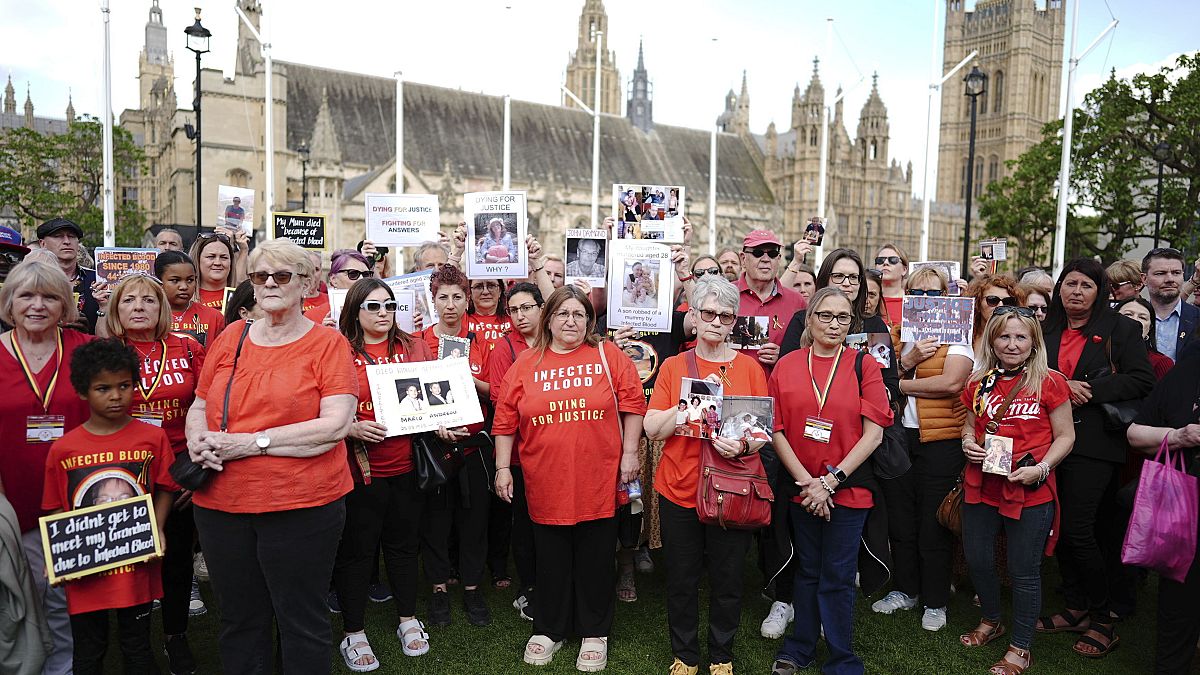The UK prime minister issued an apology in the House of Commons, promising to compensate victims for the government's failings.
An inquiry report into the UK's infected blood scandal in the 1970s and 1980s documented a series of failures by "successive governments" and medical professionals in the UK.
Roughly 3,000 people are believed to have died as a result of being infected with HIV and hepatitis from blood transfusions during what's seen as the deadliest scandal to afflict the UK's National Health Service (NHS) since its inception in 1948.
"It will be astonishing to anyone who reads this Report that these events could have happened in the UK," reads the inquiry report's introductory summary.
"It may also be surprising that the questions why so many deaths and infections occurred have not had answers before now," it continues.
The inquiry found that the scale of what happened was "horrifying" and caused "a level of suffering which it is difficult to comprehend".
"All the evidence points to a single inescapable conclusion that children and adults were not treated in a way which prioritised their safety above other considerations," said Sir Brain Langstaff, a former judge who chaired the inquiry while presenting the report on Monday.
He said the failures to tell people about the risks of the blood products or about their infections were widespread, wrong, and unethical.
'Day of shame for British state'
UK Prime Minister Rishi Sunak told parliament on Monday evening that it was a "day of shame for the British state".
"Today’s report shows a decades-long moral failure at the heart of our national life from the National Health Service to the civil service to ministers in successive governments, at every level the people and institutions in which we place our trust failed in the most harrowing and devastating way," Sunak said, as he issued an apology and promised the state would pay compensation to the victims.
"Whatever it costs to deliver this scheme, we will pay it," he added.
Jason Evans, who was four when his father died at the age of 31 in 1993 after contracting HIV and hepatitis from an infected blood plasma product, said the scandal blanketed his entire life.
“My dad knew he was dying and he took many home videos, which I’ve got and replayed over and over again growing up because that’s really all I had,” he added.
Evans was instrumental in the decision by then-Prime Minister Theresa May to establish the inquiry in 2017. He said he just "couldn’t let it go".
What is the infected blood scandal?
In the 1970s and 1980s, people with bleeding disorders and those who needed blood transfusions were infected with life-threatening viruses because the blood products were tainted.
Roughly 26,800 who needed blood transfusions were infected with hepatitis C, the report found. The transfusions were often linked to childbirth or surgery.
The report also found that around 1,250 people with bleeding disorders were infected with HIV, including an estimated 380 children. Three-quarters of those people have died, the report said.
"This disaster was not an accident. The infections happened because those in authority – doctors, the blood services and successive governments – did not put patient safety first,” said Langstaff.
"The response of those in authority served to compound people’s suffering".
Those with haemophilia, a condition affecting the blood’s ability to clot, became exposed to what was sold as a revolutionary new treatment derived from blood plasma.
In the UK, the NHS, which treats the vast majority of people, started using the new treatment, called Factor VIII, in the early 1970s.
It was more convenient when compared with an alternative treatment and was dubbed a wonder drug.
As demand overtook supply, health officials imported the drug from the US, where many plasma donations came from prisoners and drug users paid to donate blood, raising the risk of it being contaminated.
Factor VIII was made by mixing plasma from thousands of donations. In this pooling, one infected donor would compromise the whole batch.
While the World Health Organization had outlined in the 1950s how to reduce the risks of transmitting hepatitis through blood products, the advice was not followed, the report found.
'Empower the patient voice'
Langstaff said there were many lessons learnt from the report and highlighted some of his recommendations.
The former judge said that patient safety should be a "guiding principle," adding that infections could have been avoided if it had been treated as such.
Langstaff said that the public should be trusted with the truth, and criticised the delay in calling for an inquiry.
He recommended measures to "empower the patient voice so that it is heard and taken seriously in day-to-day healthcare," and called for funding for patient advocacy.
"There should have been curiosity before 2017 about what led over 3,000 people to die and thousands more to live with infections," he added.
He urged the government to implement his recommendations quickly.
"Delay not only causes frustration but it compounds the harm and suffering many of those infected and affected have endured," he said.
"Now is the time, finally, for national recognition of this disaster, for proper compensation, and for vindication for all those who have been so terribly wronged," he concluded.
This story has been updated to include details from the report.



